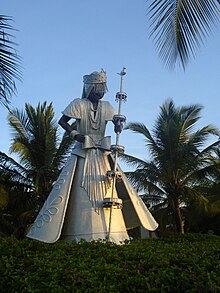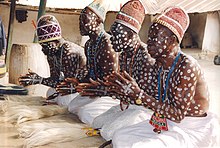
Ogun or Ogoun is a spirit that appears in several African religions. He attempted to seize the throne after the demise of Ọbàtálá, who reigned twice, before and after Oduduwa, but was ousted by Obamakin and sent on an exile – an event that serves as the core of the Ọlọ́jọ́ Festival. Ògún is a warrior and a powerful spirit of metal work, as well as of rum and rum-making. He is also known as the "god of iron" and is present in Yoruba religion, Haitian Vodou, West African Vodun, and the folk religion of the Gbe people.

Shango is an Orisha in Yoruba religion. Genealogically speaking, Shango is a royal ancestor of the Yoruba as he was the third Alaafin of the Oyo Kingdom prior to his posthumous deification. Shango has numerous manifestations, including Airá, Agodo, Afonja, Lubé, and Obomin. He is known for his powerful double axe (Oṣè). He is considered to be one of the most powerful rulers that Yorubaland has ever produced.

Oshun is an orisha, a spirit, a deity, or a goddess that reflects one of the manifestations of the Yorùbá Supreme Being in the Ifá oral tradition and Yoruba-based religions of West Africa. She is one of the most popular and venerated Orishas. Oshun is an important river deity among the Yorùbá people. She is the goddess of divinity, femininity, fertility, beauty, and love. She is connected to destiny and divination.

Oduduwa was a Yoruba divine king, legendary founder of the Ife Empire and a creator deity (orisha) in the Yoruba religion. According to tradition, he was the holder of the title of the Olofin of Ile-Ife, the Yoruba holy city. He ruled briefly in Ife, and also served as the progenitor of a number of independent royal dynasties in Yorubaland.
Olokun is an orisha spirit in Yoruba religion. Olokun is believed to be the parent of Aje, the orisha of great wealth and of the bottom of the ocean. Olokun is revered as the ruler of all bodies of water and for the authority over other water deities. Olokun is highly praised for their ability to give great wealth, health, and prosperity to their followers. Communities in both West Africa and the African diaspora view Olokun variously as female, male, or androgynous.

Orishas are divine spirits that play a key role in the Yoruba religion of West Africa and several religions of the African diaspora that derive from it, such as Cuban, Dominican and Puerto Rican Santería and Brazilian Candomblé. The preferred spelling varies depending on the language in question: òrìṣà is the spelling in the Yoruba language, orixá in Portuguese, and orisha, oricha, orichá or orixá in Spanish-speaking countries.

Ifẹ̀ is an ancient Yoruba city in south-western Nigeria, founded in the 6th century. The city is located in present-day Osun State. Ifẹ̀ is about 218 kilometers northeast of Lagos with a population of over 500,000 people, which is the highest in Osun State according to population census of 2006.

The Yoruba religion, West African Orisa (Òrìṣà), or Isese (Ìṣẹ̀ṣe), comprises the traditional religious and spiritual concepts and practice of the Yoruba people. Its homeland is in present-day Southwestern Nigeria, which comprises the majority of Oyo, Ogun, Osun, Ondo, Ekiti, Kwara and Lagos States, as well as parts of Kogi state and the adjoining parts of Benin and Togo, commonly known as Yorubaland.
Mawu-Lisa is a creator goddess, associated with the Sun and Moon in Dahomey mythology. Mawu and Lisa are divine twins. According to the myths, she is married to the male god Lisa. Mawu and Lisa are the children of Nana Buluku, and are the parents of Oba Koso (Shango), known as Hebioso among the Fon.
The Ijesha are a sub-ethnicity of the Yorubas of West Africa. Ilesha is the largest town and historic cultural capital of the Ijesha people, and is home to a kingdom of the same name, ruled by an Oba locally styled as the Owa Obokun Adimula. The present ruling family of Ijesha is the Aromolaran family with the current reigning Owa Obokun being Oba Gabriel Adekunle Aromolaran.

Babalú-Aye, Oluaye, Ṣọpọna, Ayé in Trinidad Orisha, or Obaluaiye, is one of the orishas or manifestations of the supreme creator god Olodumare in the Yoruba religion of West Africa. Babalú-Aye is the spirit of the Earth and strongly associated with infectious disease, and healing.

The Legends of Africa reflect a wide-ranging series of kings, queens, chiefs and other leaders from across the African continent including Mali, Benin, Ghana, Nigeria, Congo, Ethiopia, Eritrea and South Africa.

The documented history begins when Oranyan came to rule the Oyo Empire, which became dominant in the early 17th century. The older traditions of the formerly dominant Ile-Ife kingdom are largely oral.

The Yoruba of West Africa are responsible for a distinct artistic tradition in Africa, a tradition that remains vital and influential today.

The Olokun Festival is the name of annual cultural festival in Nigeria celebrated throughout Yorubaland by various Yoruba people groups, and also by the Edo. In the Yoruba Language, Okun means Sea, while Osa means Lagoon. Olokun is the goddess/god of the sea, while Olosa also known as Osara is the Goddess of the lagoon and estuaries. Both are celebrated and venerated in different festivals.

The Olojo Festival is an ancient festival celebrated annually in Ife, Osun State, Nigeria. It is one of the popular festivals in the Yoruba land, and was once described by Oba Adeyeye Enitan Ogunwusi as a festival that celebrates the Black race all over the world. The Yoruba word 'Olojo' means 'The Day Of The First Dawn' that describes the grateful heart of man towards God's creation and the existence of Human. The Olojo Festival is a culture festival in the calendar of the Ile-Ife, Osun State which is located in the Southwestern part of Nigeria. It is the celebration of the remembrance of “Ogun”, god of Iron, who is believed to be the first son of Oduduwa, progenitor of the Yoruba people. The festival is held annually in October. It is one of the biggest festival on the culture calendar of lle-Ife.
Iyami Aje is a Yoruba term of respect and endearment used to describe a woman of African ancestry who is considered to be an Aje, a woman who wields myriad arcane creative biological, spiritual, and cosmic powers.

The Ajilesoro Royal Dynasty in llara Ile-lfe emerged from Obalufon Ogbogbodirin who succeeded his forebears Osangangan Obamakin (Oranfe) and Ogun; who reigned as the second and third Ooni of Ife over 4,000 years ago after the reign of Oduduwa. The Ooni of Ife was a traditional ruler amongst the Yoruba people.
Oke Ora is an ancient community and archaeological site situated on a hill about 8 km east of Ufẹ̀ (Ilé-Ifẹ̀), in between the city and the small village of Itagunmodi. Two important characters in the early history of Yorubaland; Oranife (Oramfe) and Oduduwa came from Oke Ora. Several stories and legends of the Yoruba people surround the site, and today, it continues to play an important role in certain religious rites of the Ife people, most siginpificantly, in the coronation rituals of the Owoni (Ooni), king of Ifẹ̀.
















